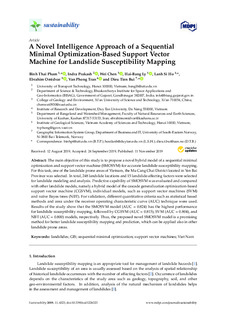A Novel Intelligence Approach of a Sequential Minimal Optimization-Based Support Vector Machine for Landslide Susceptibility Mapping
Binh Thai, Pham; Prakash, Indra; Chen, Wei; Ly, Hai-Bang; Ho, Lanh Si; Omidvar, Ebrahim; Tran, Van Phong; Tien Bui, Dieu
Journal article, Peer reviewed
Published version
Permanent lenke
http://hdl.handle.net/11250/2638362Utgivelsesdato
2019Metadata
Vis full innførselSamlinger
- Institutt for økonomi og it [152]
- Publikasjoner fra CRIStin [3416]
Sammendrag
The main objective of this study is to propose a novel hybrid model of a sequential minimal optimization and support vector machine (SMOSVM) for accurate landslide susceptibility mapping. For this task, one of the landslide prone areas of Vietnam, the Mu Cang Chai District located in Yen Bai Province was selected. In total, 248 landslide locations and 15 landslide-affecting factors were selected for landslide modeling and analysis. Predictive capability of SMOSVM was evaluated and compared with other landslide models, namely a hybrid model of the cascade generalization optimization-based support vector machine (CGSVM), individual models, such as support vector machines (SVM) and naïve Bayes trees (NBT). For validation, different quantitative criteria such as statistical based methods and area under the receiver operating characteristic curve (AUC) technique were used. Results of the study show that the SMOSVM model (AUC = 0.824) has the highest performance for landslide susceptibility mapping, followed by CGSVM (AUC = 0.815), SVM (AUC = 0.804), and NBT (AUC = 0.800) models, respectively. Thus, the proposed novel SMOSVM model is a promising method for better landslide susceptibility mapping and prediction, which can be applied also in other landslide prone areas
Beskrivelse
Licensee MDPI, Basel, Switzerland. This article is an open access article distributed under the terms and conditions of the Creative Commons Attribution (CC BY) license

